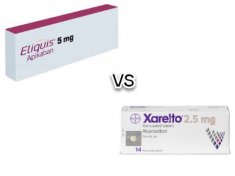This article primarily will center on GU infections of the bladder and kidney. But first, an introductory metaphor to illustrate the issue at hand.
Body Spaces and Stagnant Ponds
Look at any stagnant pond. Covered by green scum and stinky, it is an entirely different ecosystem from what is typical in a flowing, renewing, currents of water. The human body is no different. It doesn’t like standing collections of fluid. When that happens, the conditions become excellent for invaders who seize the opportunity to set up house.
Whether it’s fluid behind the ear drum of a child swimmer, bile stasis from gallstones interfering with drainage, or a consistent puddle of urine from incompletely emptying one’s bladder, one thing is certain: infection will occur. Our bodies are dynamic, and there are repetitive sequences (e.g., heartbeat), feedback loops (e.g., menstruation), and spaces awash with fluids that balance filling with emptying (e.g., the bladder). Anything interf ...
Eliquis vs Xarelto, Pradaxa, Coumadin, and Aspirin
“Blood thinner” is a misleading term. What is implied is that it dilutes the thickness of the blood, such that very thick accumulations (clots) won’t happen. In reality, blood thinners alter the body’s clotting mechanism at the cellular level. To make a clot, there is a cascade of changes—a falling of dominoes. What blood thinners do is interfere with that cascade—pick up one domino so that the sequential falls are stopped at that blank spot.
It’s not like self-sealing antifreeze
Clotting is the body’s way of self-sealing. Because it is also involved in repair of damaged tissue, initiating of healing, and an integral part of the entire inflammatory process, it is not like Silly Putty or self-sealing antifreeze.
Clotting is tricky: too much and blood won’t flow (as in a blood clot in a vein); too little and blood flows too much, flooding tissues destructively (as ...

